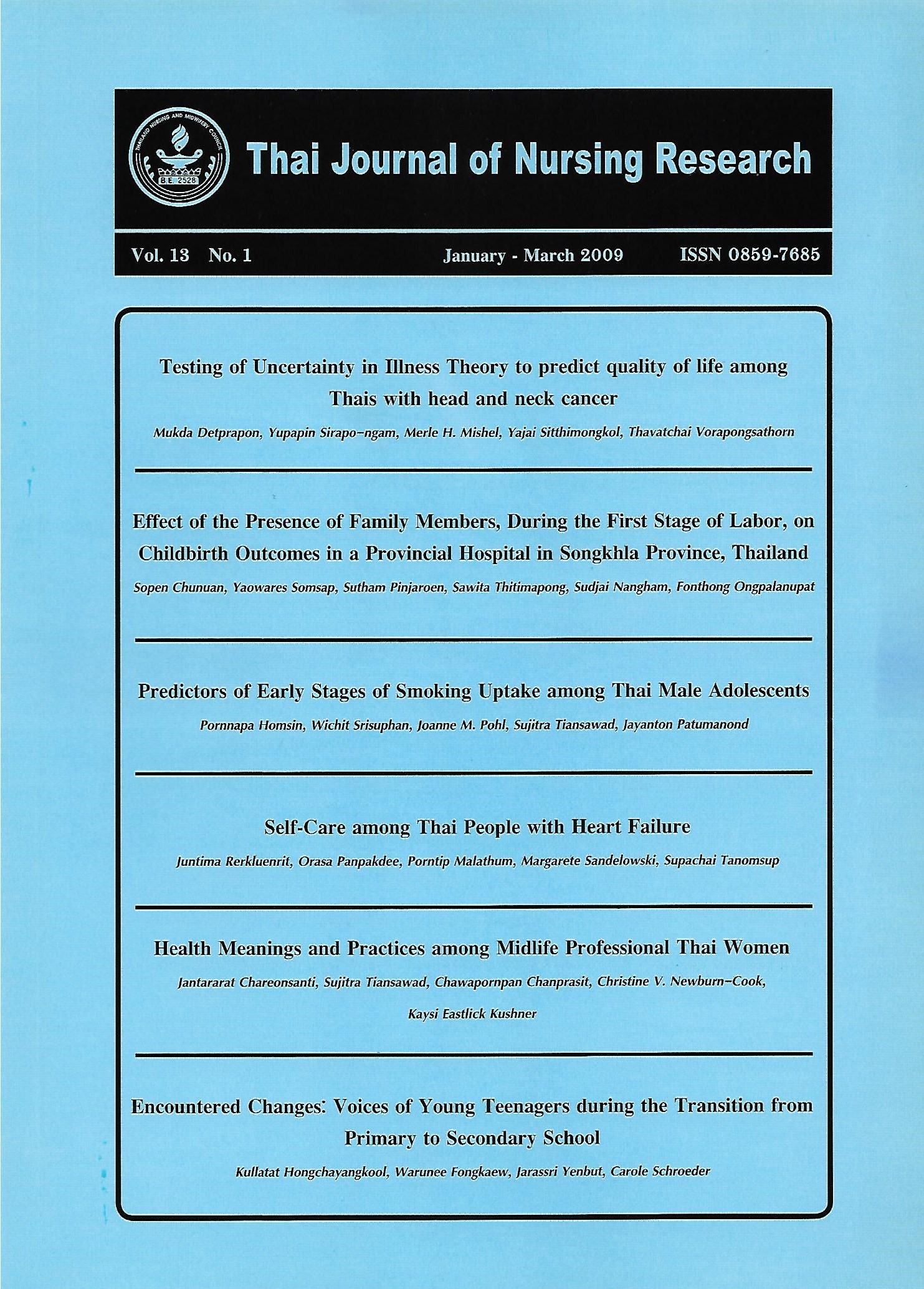Testing of Uncertainty in Illness Theory to predict quality of life among Thais with head and neck cancer
Keywords:
การทดสอบทฤษฎี, ความรู้สีกไม่แน่นอน, คุณภาพชีวิต, มะเร็งบริเวณศีรษะและคอ, theory testing, uncertainty, quality of life, head and neck cancerAbstract
บทคัดย่อ
การศึกษาภาคตัดขวางเชิงบรรยายในครั้งนี้ เพื่อทดสอบทฤษฎีความรู้สีกไม่แน่นอน ในความเจ็บป่วยเพื่อทำนายคุณภาพชีวิตของผู้ป่วยมะเร็งบริเวณศีรษะและคอ ตัวแปรที่ศึกษา ประกอบด้วย ประสบการณ์การเกิดอาการ การปฏิบัติกิจกรรมทางศาสนาพุทธ ความรู้สีกไม่แน่นอน ภาวะซึมเศร้า และคุณภาพชีวิต ผู้เข้าร่วมการวิจัยคือผู้ป่วยมะเร็งบริเวณศีรษะและคอ จานวน 240 คน จากโรงพยาบาล 5 แห่งในกรุงเทพมหานคร ประเทศไทย เครื่องมือที่ใช้ประกอบด้วย แบบประเมินเกี่ยวกับการนึกคิดและการจำ แบบสอบถามข้อมูลส่วนบุคคล แบบสอบถามประสบการณ์เกี่ยวกับอาการ แบบวัดการปฏิบัติกิจกรรมทางพุทธศาสนา แบบสอบถามภาวะซึมเศร้า และแบบสอบถามคุณภาพชีวิต รูปแบบที่สร้างขึ้นได้รับการทดสอบและปรับด้วยโปรแกรมลิสเรล 8.52
รูปแบบที่ปรับแล้วมิความสอดคล้องกับข้อมูล และอธิบายความแปรปรวนของตัวแปร ความรู้สีกไม่แน่นอน ภาวะซึมเศร้า และคุณภาพชีวิตได้เป็นส่วนใหญ่ ผลการศึกษาพบว่า ประสบการณ์การเกิดอาการ มีอิทธิพลทั้งโดยตรงทางบวกต่อความรู้สีกไม่แน่นอน และมิอิทธิพลทางอ้อมต่อภาวะซึมเศร้าและคุณภาพชีวิตผ่านความรู้สีกไม่แน่นอน นอกจากนี้ความรู้สีกไม่แน่นอนมีอิทธิพลโดยตรงทางลบต่อคุณภาพชีวิต และอิทธิพลโดยตรงทางบวกต่อภาวะซึมเศร้า การปฏิบัติกิจกรรมทางศาสนาพุทธมีอิทธิพลโดยตรงทางบวกต่อคุณภาพชีวิตถึงแม้จะไม่มีนัยสำคัญทางสถิติ แต่ไม่มีผลทางอ้อมต่อความรู้สีกไม่แน่นอนผ่านประสบการณ์การเกิดอาการและไม่มีผลทางอ้อมต่อภาวะซึมเศร้าและคุณภาพชีวิตผ่านความรู้สีกไม่แน่นอนผลการศึกษาในครั้งนี้ช่วยในการจัดการกับอาการและความร้สีกไม่แน่นอน ซึ่งส่งเสริมให้สามารถป้องกันหรือลดความซึมเศร้า และเพิ่มคุณภาพชีวิตของผู้ป่วยมะเร็งบริเวณศีรษะและคอได้
คำสำคัญ: การทดสอบทฤษฎี ความรู้สีกไม่แน่นอน คุณภาพชีวิต มะเร็งบริเวณศีรษะและคอ
Abstract :
This cross - sectional descriptive study tested the Uncertainty in Illness Theory to determine factors influencing quality of life among Thais with head and neck cancer . The selected variables were symptom experience , Buddhist practices , uncertainty , depression , and QOL . A sample of 240 head and neck cancer patients was recruited from five hospitals in Bangkok . The instruments included a : Set Test ; Demographic Questionnaire ; Modified Symptom Experience Scale ; Buddhist Practices Scale ; Community version of Mishel’s Uncertainty in Illness Scale ; Center for Epidemiologic Studies Depression Scale ; and , Version 4 of the Functional Assessment of Cancer Therapy - General Scale . The hypothesized model was tested using LISREL 8.52 .
The model fit the empirical data and explained the majority of the variance in uncertainty , depression and quality of life among the subjects . Symptom experience had a positive impact directly on uncertainty and indirectly on depression and QOL , mediated through uncertainty . On the other hand , uncertainty had a negative impact on quality of life , but a positive impact on depression . Buddhist practices had a positive , although non - significant , impact on QOL , but did not have an indirect effect either on uncertainty through symptom experience or on depression and QOL through uncertainty . These findings may help in managing symptom experience and uncertainty , contribute to preventing and reducing depression , and enhance QOL in patients with head and neck cancer .
Key words : theory testing , uncertainty , quality of life, head and neck cancer
Downloads
How to Cite
Issue
Section
License
Copyright: The Pacific Rim International Journal of Nursing Research, Thailand Nursing & Midwifery Council has exclusive rights to publish, reproduce and distribute the manuscript and all contents therein.








.png)



